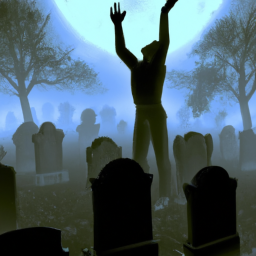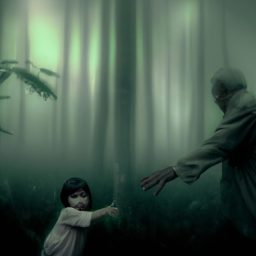Every night, I am haunted by dreams of death. My mind has become a dark place, fixated on the inevitable. Each nightmare is vivid and terrifying, leaving me unsettled long after I wake up.
I know I’m not alone in this experience, as many people struggle with dreams about death. But why do we have these dreams? What is our subconscious trying to tell us?
As I delved deeper into the world of dream interpretation, I discovered that there are many different theories about why we dream about death. Some say it’s a sign of impending change or transformation in our lives, while others suggest that it’s a reflection of our own fears and anxieties.
Regardless of the interpretation, one thing is clear: these dreams are powerful and can have a profound impact on our emotional and psychological well-being. In this article, I’ll explore the different interpretations of dreams about death, as well as provide some coping strategies for dealing with these unsettling dreams.
Key Takeaways
- Dreams about death can have hidden meanings and reflect fears and anxieties.
- Symbolism analysis and keeping a dream journal can provide insight into the subconscious.
- Coping strategies include identifying patterns/triggers and seeking professional help if needed.
- Exploring dreams can lead to self-discovery and healing, and embracing change is important for personal growth.
Understanding the Basics of Dream Interpretation
Want to know why you keep having those intense dreams about people dying? Let’s break down the basics of dream interpretation!
Many people believe that dreams have hidden meanings that can be interpreted to reveal important truths about our waking lives. However, there are common misconceptions about how dreams should be interpreted. One of these misconceptions is that every dream has a specific meaning that is universally understood.
In reality, dream interpretation is highly individualized and can be influenced by cultural norms and personal experiences. For example, in some cultures, dreaming about death is seen as a positive sign that represents rebirth or transformation. In other cultures, it is viewed as a negative omen that signals impending doom.
These cultural influences can significantly impact the way that we interpret our dreams. It’s important to remember that dreams are highly subjective and can have multiple interpretations. In fact, the same dream can mean different things to different people depending on their personal experiences and associations.
With this in mind, it’s helpful to approach dream interpretation with an open mind and a willingness to explore different possibilities. So, let’s explore the different interpretations of dreams about death and what they could mean for you.
Different Interpretations of Dreams About Death
Interpreting dreams about death can vary greatly depending on the individual’s beliefs and cultural background. For some, death may represent a new beginning, a change or transformation. In this case, dreaming about death can be a positive sign of personal growth and development.
However, for others, death may symbolize the end, finality or loss. In this case, dreaming about death can be a negative sign of fear, anxiety or grief.
Symbolic meanings of dreams about death can also be influenced by cultural beliefs and values. For example, in some cultures, death is seen as a natural part of life and a transition to the afterlife. In other cultures, death is viewed as a taboo subject and a source of fear and superstition.
These cultural influences can shape our subconscious minds and affect the way we interpret our dreams.
Understanding the symbolic meanings and cultural influences behind dreams about death can provide insight into our subconscious thoughts and emotions. By exploring these interpretations, we can gain a better understanding of ourselves and our psyche.
In the next section, we’ll delve into the psychological reasons for dreams about death and how they can be used for personal growth and healing.
Psychological Reasons for Dreams About Death
Now, you may be wondering why you have these dreams about death, but it’s important to understand that they can be a reflection of your own inner fears, anxieties, and unresolved emotions. Dreams are often a way for our subconscious to process and deal with unresolved issues in our waking life.
The fear of death is a common anxiety that many people experience, and dreams about death can be a manifestation of that fear. One way to cope with these dreams is to try to identify the underlying emotions that they are reflecting.
Are you feeling anxious about a particular situation in your life? Are you struggling with unresolved grief or loss? Once you identify the underlying emotions, you can work to address them in your waking life. This may involve seeking therapy or counseling, which can provide you with coping mechanisms to help you deal with your fears and anxieties.
Therapy sessions can also help you work through any unresolved emotional issues that may be contributing to your dreams about death. In therapy, you can explore the root causes of your anxiety and work on developing strategies to manage your emotions. By learning how to cope with your fears and anxieties, you may find that your dreams about death become less frequent or intense.
In the next section, we’ll explore common themes and symbols in dreams about death and what they may mean.
Common Themes and Symbols in Dreams About Death
Identifying common themes and symbols in dreams about death can provide insight into the subconscious emotions and fears that may be contributing to these dreams. Some common themes in these dreams include witnessing the death of others, experiencing one’s own death, or encountering death-related objects or places. These themes can be interpreted as representations of deep-seated anxieties surrounding loss, change, and mortality.
Symbolism analysis can also shed light on the meaning behind dreams about death. For example, the presence of a coffin or tombstone may symbolize a fear of the unknown or the end of something. In some cultures, death is seen as a natural part of the cycle of life, while in others it may be viewed as a taboo or taboo subject. These cultural influences can shape the way we interpret and understand our dreams, and may even contribute to the types of symbols that appear in them.
By analyzing common themes and symbols in dreams about death, we can gain greater insight into the underlying emotions and fears that may be influencing our subconscious minds. Understanding these emotions can help us to better cope with the challenges and uncertainties of life, and may even help us to prevent or overcome negative patterns of thought and behavior.
In the next section, we’ll explore some tips for analyzing your own dreams about death and uncovering the hidden meanings behind them.
How to Analyze Your Own Dreams About Death
To better understand your dreams about death, start by reflecting on your emotions and experiences from the day before. Consider the people you interacted with, the events that occurred, and any stressors you may have encountered. This can help you identify any underlying emotions or anxieties that may be manifesting in your dreams.
Another helpful tool for interpreting symbols in your dreams is keeping a dream journal. Write down the details of your dream as soon as you wake up, including any people, objects, or actions that stood out to you. Then, try to identify any common themes or symbols that may be present. For example, dreaming about a loved one dying may symbolize fear of loss or abandonment.
If your dreams about death are causing significant distress or interfering with your daily life, it may be helpful to seek professional help. A therapist can help you explore any underlying emotional issues and develop coping strategies for managing your dreams.
Remember, dreams are a natural part of the human experience and can offer valuable insights into our subconscious mind. By taking the time to analyze your dreams, you can gain a deeper understanding of yourself and your emotions.
While analyzing your dreams can be a helpful tool, it’s also important to develop coping strategies for dealing with the emotions that arise from these dreams. In the next section, we’ll explore some effective coping techniques for managing dreams about death.
Coping Strategies for Dealing with Dreams About Death
Analyzing my dreams about death has been helpful, but coping with the emotions they bring up can still be challenging.
Sometimes, these dreams feel so real that I wake up feeling anxious, sad, or scared. It’s important to remember that these dreams don’t necessarily predict the future or indicate that something terrible is going to happen. They may simply reflect my subconscious thoughts or fears.
One way to cope with these dreams is through journaling exercises. Writing down my dreams and my feelings about them can help me process my emotions and gain insight into what they might mean. I can also try to identify any patterns or triggers that might be causing these dreams. This can help me feel more in control and less helpless in the face of these unsettling dreams.
If these dreams persist or become too overwhelming, seeking professional help may be necessary. A therapist can provide me with tools and strategies to manage my anxiety and fear. They can also help me explore any underlying issues that might be contributing to these dreams. Talking to someone who’s trained to help can provide me with the support I need to work through these emotions and move forward.
Learning to embrace change and transformation can be difficult, but it’s an important part of personal growth. By facing my fears and seeking help when I need it, I can develop greater resilience and emotional strength. Coping with dreams about death may feel challenging, but it can also be an opportunity for self-discovery and healing.
Learning to Embrace Change and Transformation
Embracing change and transformation is like a caterpillar turning into a butterfly. It may be uncomfortable and scary, but it ultimately leads to beautiful growth and new possibilities.
As human beings, we often resist change because it can be difficult to let go of what we know and what feels comfortable. However, personal growth requires change and transformation. It’s important to recognize that change is a necessary part of life, and learning to embrace it can lead to a more fulfilling and meaningful existence.
To embrace change, we must first acknowledge our fears and anxieties. Change can trigger feelings of uncertainty and vulnerability. These emotions can be uncomfortable and challenging to navigate, but if we can learn to sit with them and recognize them for what they are, we can begin to move past them.
This may involve seeking support from friends, family, or a therapist, or engaging in mindfulness practices to help us stay present and grounded in the midst of change. Ultimately, embracing change and transformation is about letting go of what no longer serves us and creating space for new possibilities to emerge.
This may involve making difficult choices or taking risks, but it can lead to a sense of purpose and fulfillment that is impossible to achieve when we cling to the familiar. By embracing change and opening ourselves up to personal growth, we can live more fully and authentically, and create a life that is truly our own.
As we move forward, it’s important to reflect on our subconscious fears and anxieties and to recognize that they may be holding us back from reaching our full potential.
The Importance of Reflecting on Our Subconscious Fears and Anxieties
Have you ever considered how your subconscious fears and anxieties may be holding you back from achieving your full potential? It’s important to take the time to reflect on the hidden fears and anxieties that we may have buried deep within ourselves. One way to do this is by exploring our dreams and the meanings behind them. For instance, if you keep having dreams about people dying, it may be a reflection of your fears surrounding loss or change.
By exploring our fears and anxieties, we can begin to understand why they exist and how they are affecting our lives. It’s important to remember that fear is a natural human emotion and that we all experience it to some degree. However, when these fears begin to hold us back, we must take action to overcome them. One way to do this is by practicing mindfulness and living in the present moment. By staying present, we can better manage our fears and anxieties and prevent them from controlling our lives.
Exploring our fears and anxieties is an essential step towards achieving our full potential. By taking the time to reflect on our subconscious thoughts and feelings, we can gain a deeper understanding of ourselves and the world around us. So if you find yourself having dreams about people dying, take a moment to reflect on what this may mean for you and how you can overcome any fears or anxieties that may be holding you back. This will help you find meaning and purpose in your dreams and in your life.
Finding Meaning and Purpose in Our Dreams
You can’t afford to ignore the incredible insights and revelations that your dreams provide you with, especially when it comes to discovering your true purpose and meaning in life. Dreams aren’t just random images and experiences that happen when you sleep, but they can be a powerful tool to help you uncover your subconscious fears, desires, and needs.
One of the ways to find meaning and purpose in our dreams is by exploring the symbolism that appears in them. For example, if you keep having dreams about people dying, it could represent a fear of loss, change, or the end of something important in your life.
Exploring the symbolism in your dreams can help you understand the deeper meaning behind them and provide you with guidance on how to navigate your waking life. It can also reveal some of the hidden patterns and themes that are playing out in your subconscious mind.
By reflecting on your dreams and seeking guidance from them, you can gain a greater sense of clarity and direction in your life. You might discover that your dreams are pointing you towards a new career path, a new relationship, or a new way of living that aligns with your true self.
Dreams are a powerful tool for self-discovery and personal growth. If you keep having dreams about people dying, don’t ignore them. Instead, explore the symbolism behind them and seek guidance from them. Your dreams can reveal the hidden fears, desires, and needs that are currently playing out in your subconscious mind.
By reflecting on your dreams and seeking guidance from them, you can gain a greater sense of purpose and meaning in your life and move towards a more fulfilling and authentic existence.
Frequently Asked Questions
Are dreams about death always bad omens or can they have positive meanings?
Interpreting symbolism and exploring cultural influences reveals that dreams of death can have positive meanings, such as transformation or new beginnings. However, personal context must also be considered. Empathy and research can help uncover the deeper meaning.
Can medication or substance abuse affect the frequency of dreams about death?
Let me shed some light on the impact of antidepressants and alcohol consumption on the frequency of death dreams. Both can affect the brain’s neurotransmitters and lead to vivid dreams. It’s important to talk to a healthcare provider if you’re concerned.
Is there a correlation between age and the frequency of dreams about death?
Dream interpretation suggests that culture plays a significant role in the frequency of death-related dreams. Research shows that older individuals are more likely to have these dreams due to life experiences and cultural beliefs surrounding death.
Why do some people have recurring dreams about the same person dying?
I’ve heard stories of people dreaming of a loved one dying repeatedly. Psychological explanations suggest it could stem from unresolved trauma or fear of loss. Dream interpretation techniques may help uncover underlying emotional issues.
Can dreams about death be a warning sign for someone’s own mortality or the mortality of someone close to them?
Dream interpretation suggests that death dreams can symbolize change or transformation. Coping mechanisms involve processing emotions, seeking support, and finding meaning in the dream. It’s important to remember that dreams don’t always predict mortality.
Conclusion
So, you’ve been having dreams about death. It can be scary and unsettling, but it can also be a tool for self-discovery and personal growth.
By analyzing your dreams and reflecting on their meaning, you can gain insight into your fears, anxieties, and desires. You can learn to embrace change and find purpose in your life.
Don’t be afraid to explore your dreams and their significance. With the right mindset, you can turn your dreams about death into a source of inspiration and enlightenment.
So go ahead, face your fears, and unlock the secrets of your subconscious mind. Who knows what amazing discoveries and revelations await you on the other side?









